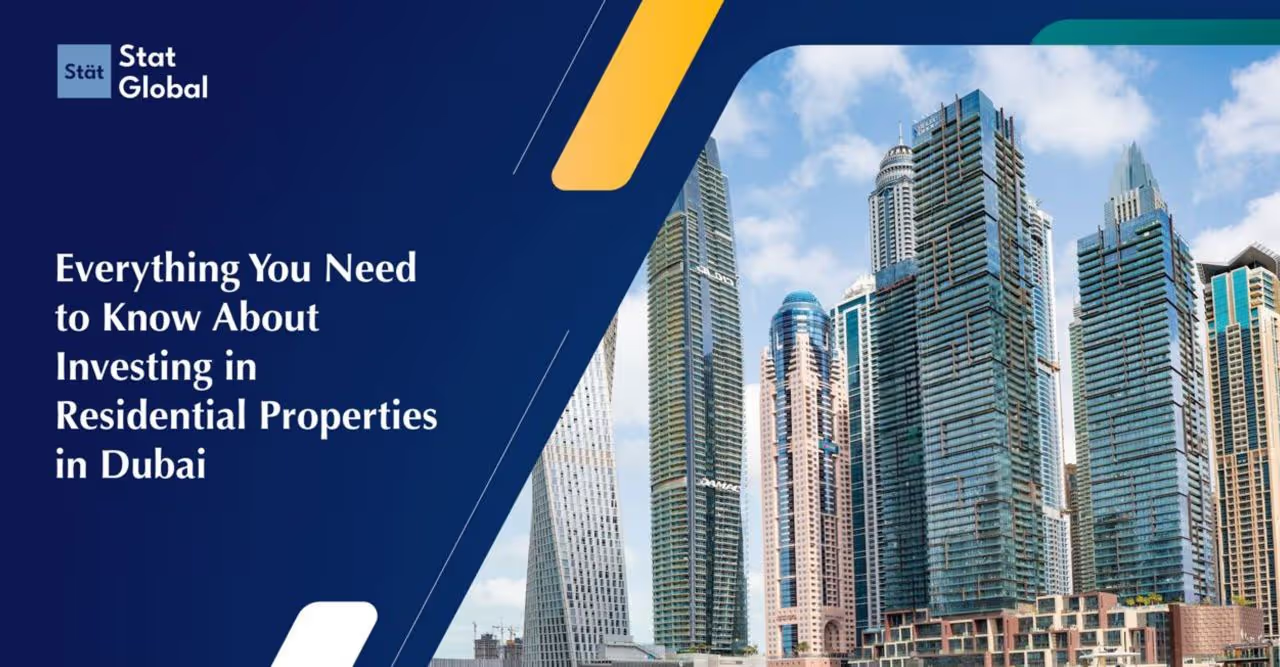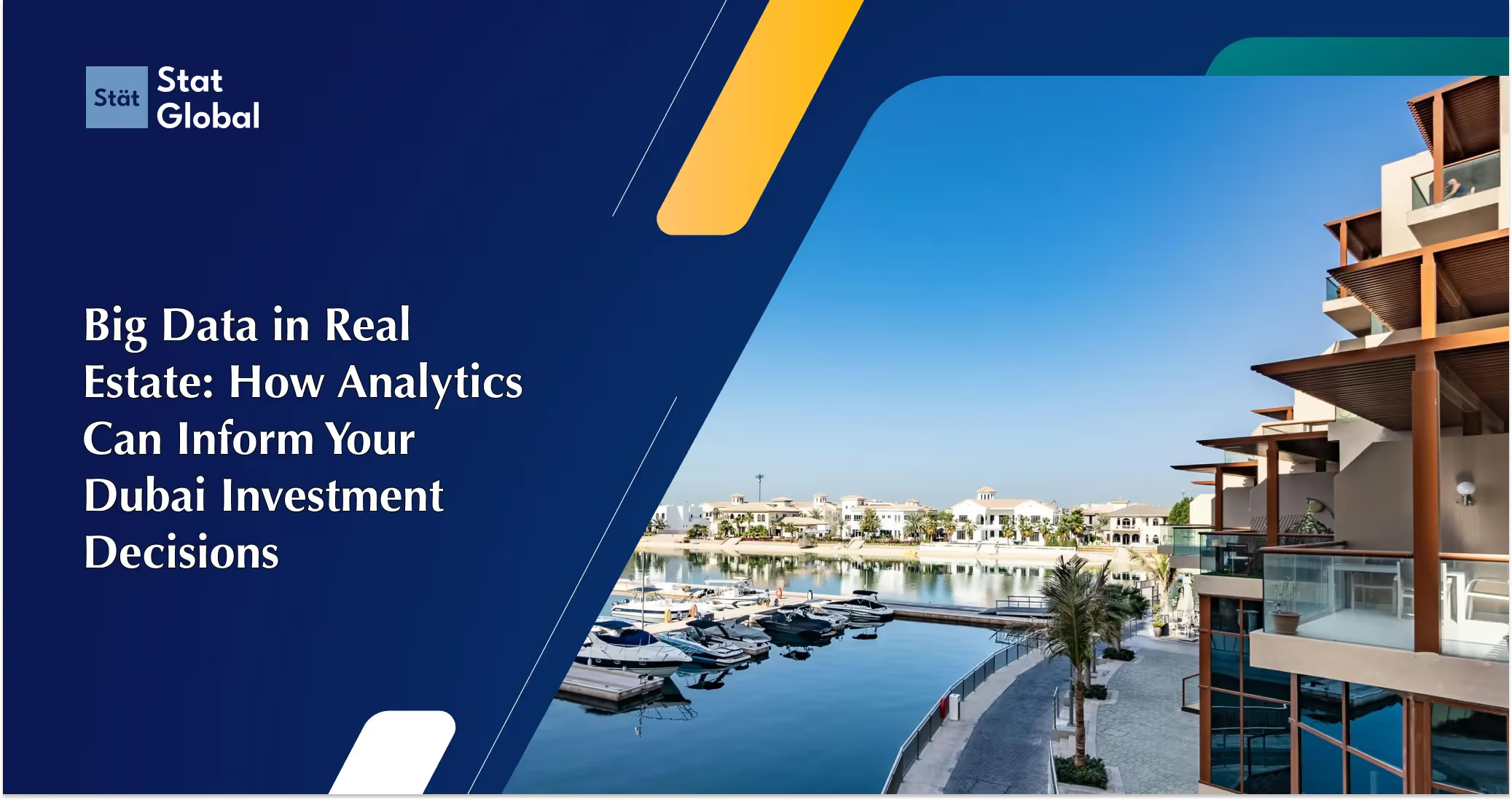
Welcome to Stat Global’s guide on investing in residential properties in Dubai. Like commercial properties offering different investment options, residential properties also have great opportunities.
We'll help you understand the intricacies of investing in residential real estate property in Dubai. Whether you know a lot about investing or you're just starting, we'll give you easy-to-understand information to help you make intelligent choices about buying homes in Dubai. Let's begin exploring all you need to know about investing in housing in this exciting city.
What is Considered Residential Property?
Residential property refers to real estate designed and used for living purposes. It includes various housing units such as houses, apartments, condominiums, townhouses, and villas. These properties are intended for individuals and families, providing them a place to call home and carry out their daily lives.
Unlike commercial properties that focus on business activities, residential properties are meant to provide comfortable and private living spaces for residents.
What are the Requirements to Invest in Residential Property in Dubai?
The requirements to invest in residential property in Dubai can vary based on your nationality, residency status, and the specific property you're interested in. Here are some general requirements for foreign investors:
- Property Ownership Zones: Foreign investors can buy residential properties in designated freehold zones in Dubai. These areas are usually set for expatriate ownership and offer a range of properties, including apartments, villas, and townhouses.
- Legal Entity: If you're a non-resident, you must set up a legal entity in Dubai to own property. This is typically done through a company or other legal structures. You'll need to engage with legal experts to establish the most suitable structure for your investment.
- Minimum Investment Amount: Some areas might have minimum investment thresholds for foreign buyers. Check the specific requirements for the property you're interested in.
- Fees and Charges: Be prepared for additional costs such as property registration fees, real estate agent commissions, and potentially service charges if you're buying within a community or development.
- Financing: Financing options for non-residents might have different terms than for residents. Make sure to explore the availability of mortgages for foreign buyers if you plan to finance your property purchase.
- Legal Documentation: To facilitate the property purchase, you must provide the necessary documents, including your passport and identification.
It's important to note that regulations and requirements can change, and consulting with legal experts or real estate professionals well-versed in Dubai's property laws is recommended. Also, remember that residency and property ownership rules can vary based on your nationality and other factors.
What are the Advantages and Disadvantages of Investing in Residential Properties?
Advantages of Investing in Residential Properties
- Steady Rental Income: Residential properties can provide a consistent source of rental income, as people always need a place to live. This income can contribute to covering mortgage payments and generating profits.
- Appreciation in Value: Well-located residential properties can appreciate over time, potentially leading to capital gains when you decide to sell.
- Diversification: Investing in residential properties diversifies your investment portfolio, reducing risk by spreading it across different asset classes.
- Larger Market: The demand for residential properties is often greater than for commercial properties, giving you a broader pool of potential tenants or buyers.
- Resilience During Economic Downturns: During economic downturns, people still need housing, making residential properties more resilient than other investments.
Disadvantages of Investing in Residential Properties
- Maintenance Costs: As a landlord, you must maintain the property. Maintenance costs can impact your rental income and profitability.
- Vacancy Risk: Periods of vacancy can affect your rental income. It's essential to have a strategy to minimize vacancies, such as competitive rental pricing and good property management.
- Tenant Management: Dealing with tenants can be challenging, including finding reliable tenants, addressing tenant issues, and managing lease agreements.
- Property Management: If you don't live near your rental property, managing it can be more challenging, requiring property management services that eat into your profits.
- Regulations and Legalities: Residential property investment has legal responsibilities, including adhering to local landlord-tenant laws and property regulations.
- Market Fluctuations: While residential properties can appreciate, their value can also be influenced by market fluctuations and economic conditions.
Ultimately, deciding to invest in residential properties should align with your financial goals, risk tolerance, and investment strategy. Conduct thorough research, consider your ability to manage the property effectively, and factor in potential costs to make an informed decision.
Legal Differences Between Investing in Commercial Properties and Residential Properties in Dubai
Yes, there are legal differences between investing in commercial properties and residential properties in Dubai.
The legal framework, regulations, and considerations can vary significantly based on the type of property you're investing in. Here are some key legal differences to be aware of:
Ownership Restrictions
- Residential Properties: Foreign individuals are generally allowed to buy specific freehold residential properties in designated areas of Dubai. However, there are restrictions on owning land, and ownership is typically in the form of apartments or townhouses.
- Commercial Properties: Ownership of commercial properties by foreigners often requires a legal presence in Dubai, such as through setting up a company or partnership. The specific legal structure will depend on the type of commercial property and the investor's intentions.
Licensing and Approvals
- Residential Properties: Buying a residential property requires only additional licenses or approvals beyond the standard property registration process.
- Commercial Properties: Depending on the type of commercial property and intended use, investors may need to obtain business licenses, permits, and approvals from relevant authorities to operate within the property legally.
Lease Agreements
- Residential Properties: Lease agreements for residential properties are governed by specific laws that provide tenant protections, including rental increase caps and dispute resolution procedures.
- Commercial Properties: Lease agreements for commercial properties offer more flexibility for landlords and tenants to negotiate terms. There is less regulation compared to residential leases, and terms can vary significantly based on the agreement between the parties.
Zoning and Use Regulations
- Residential Properties: Residential properties are zoned for residential use, and conducting commercial activities from these properties is generally only allowed with proper authorization.
- Commercial Properties: Commercial properties are zoned for specific types of business activities. The investor must ensure the intended use aligns with the property's zoning and obtain the necessary permits.
Taxes and Fees:
- Residential Properties: Residential properties are subject to various fees, including registration and real estate agent commissions.
- Commercial Properties: Commercial properties might have additional fees and taxes based on the nature of the business and the type of property.
Contact Us to Learn More About Investing in Residential Properties in Dubai
The eligibility criteria and requirements might differ based on the specific type of property and the investor's residency status. Additionally, mortgages and financing are possible even for expats in Dubai, but certain conditions need to be met before you can get a mortgage in Dubai. Reach out to us to clarify any further information applicable to your case.


.svg)










